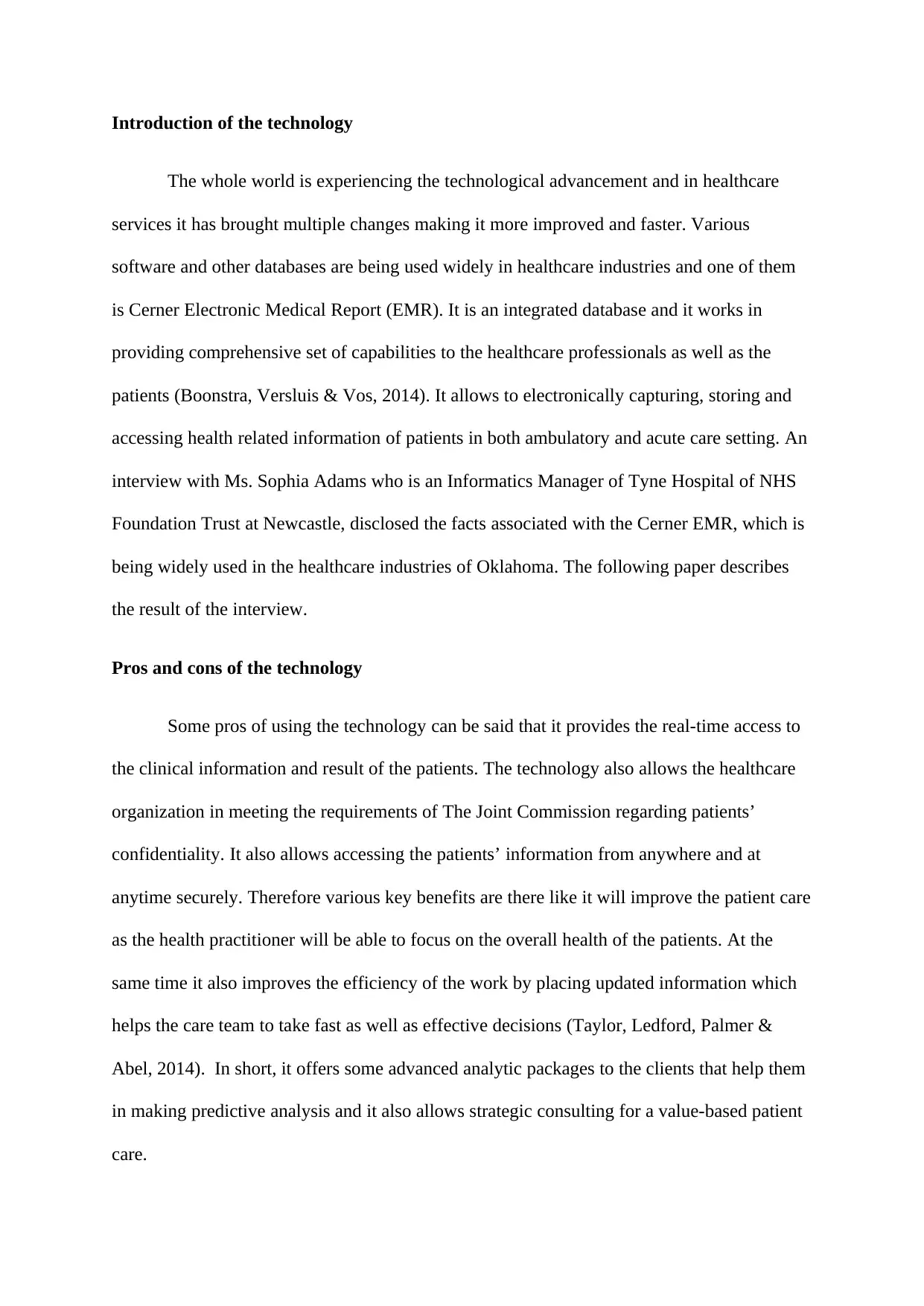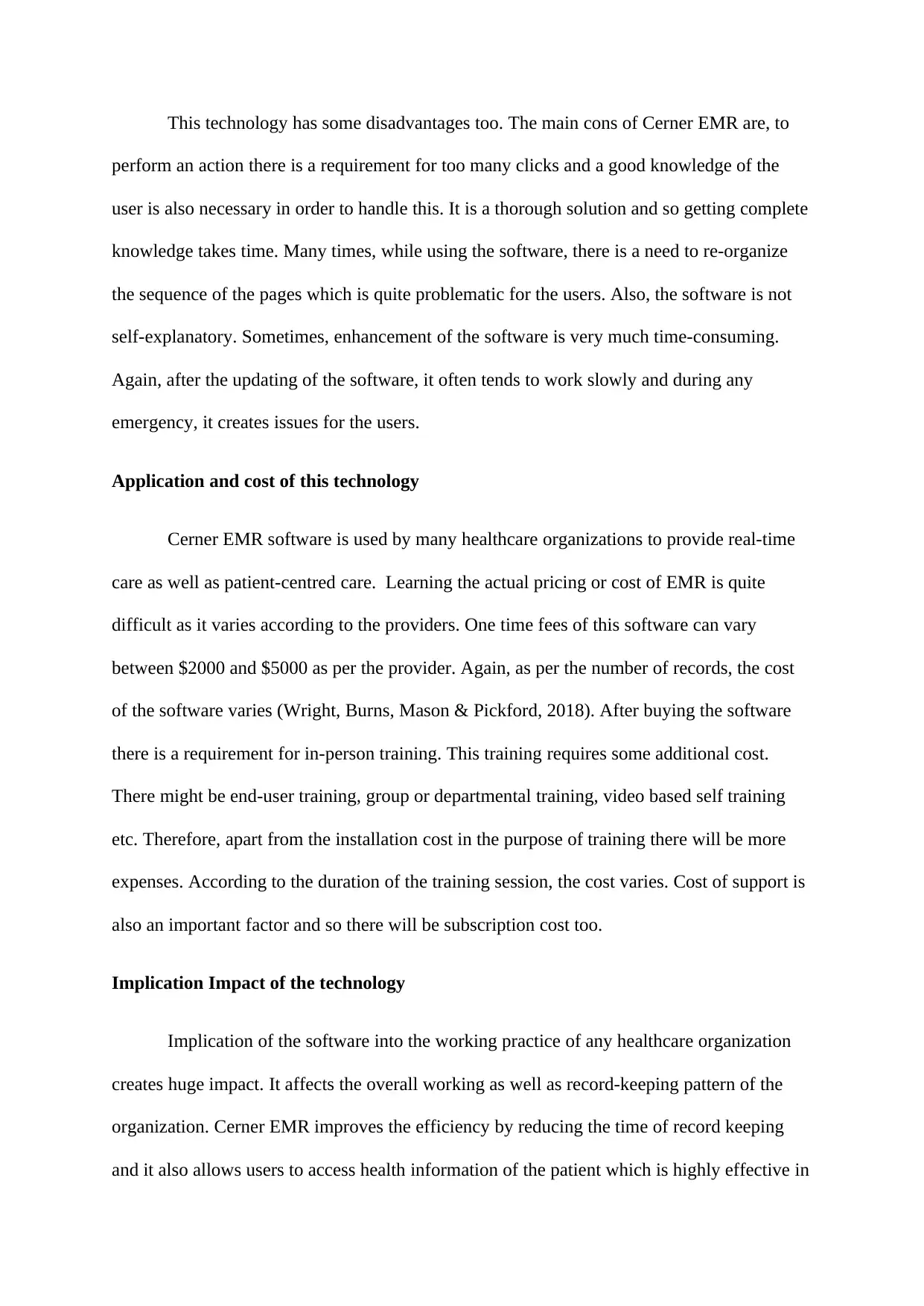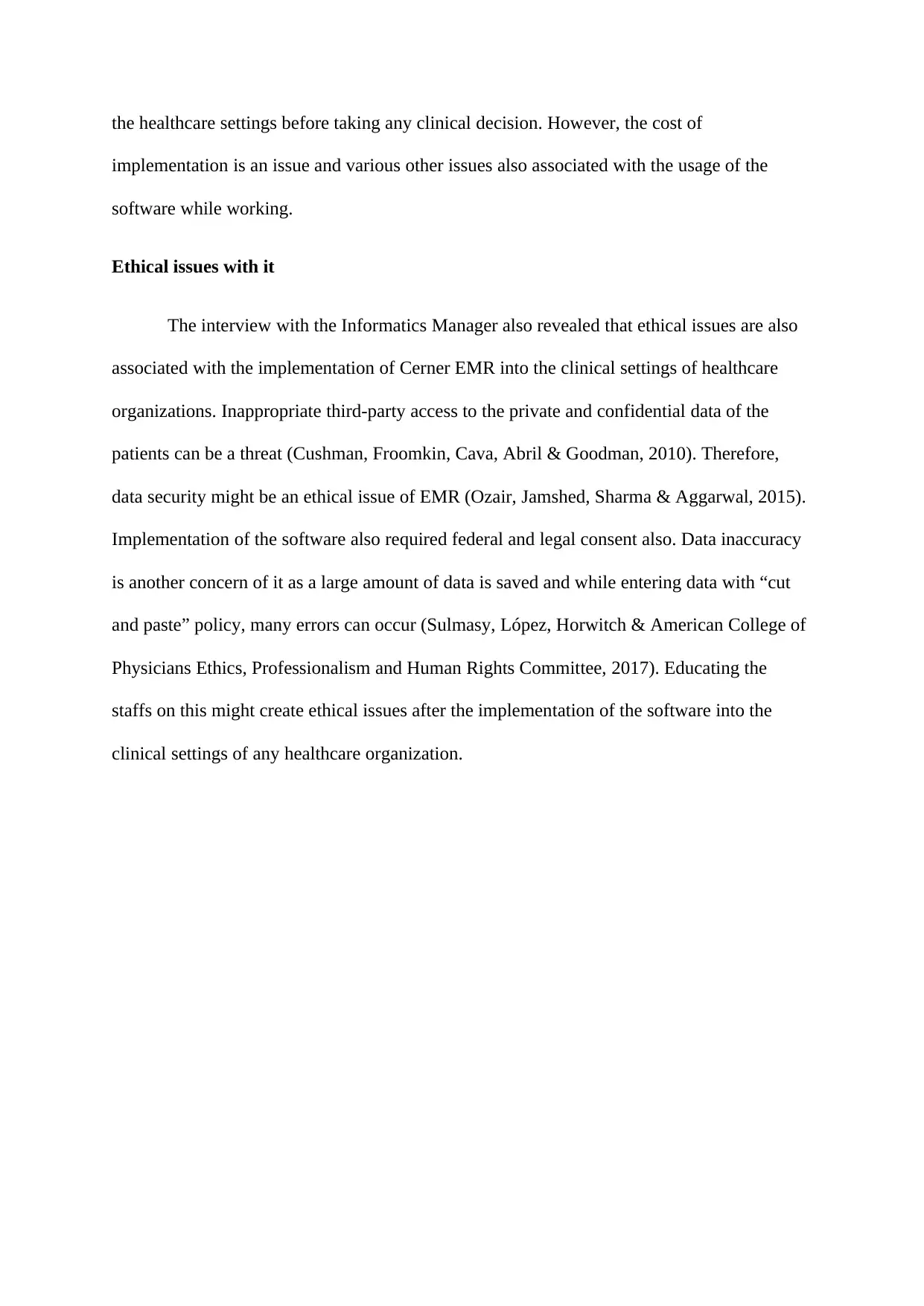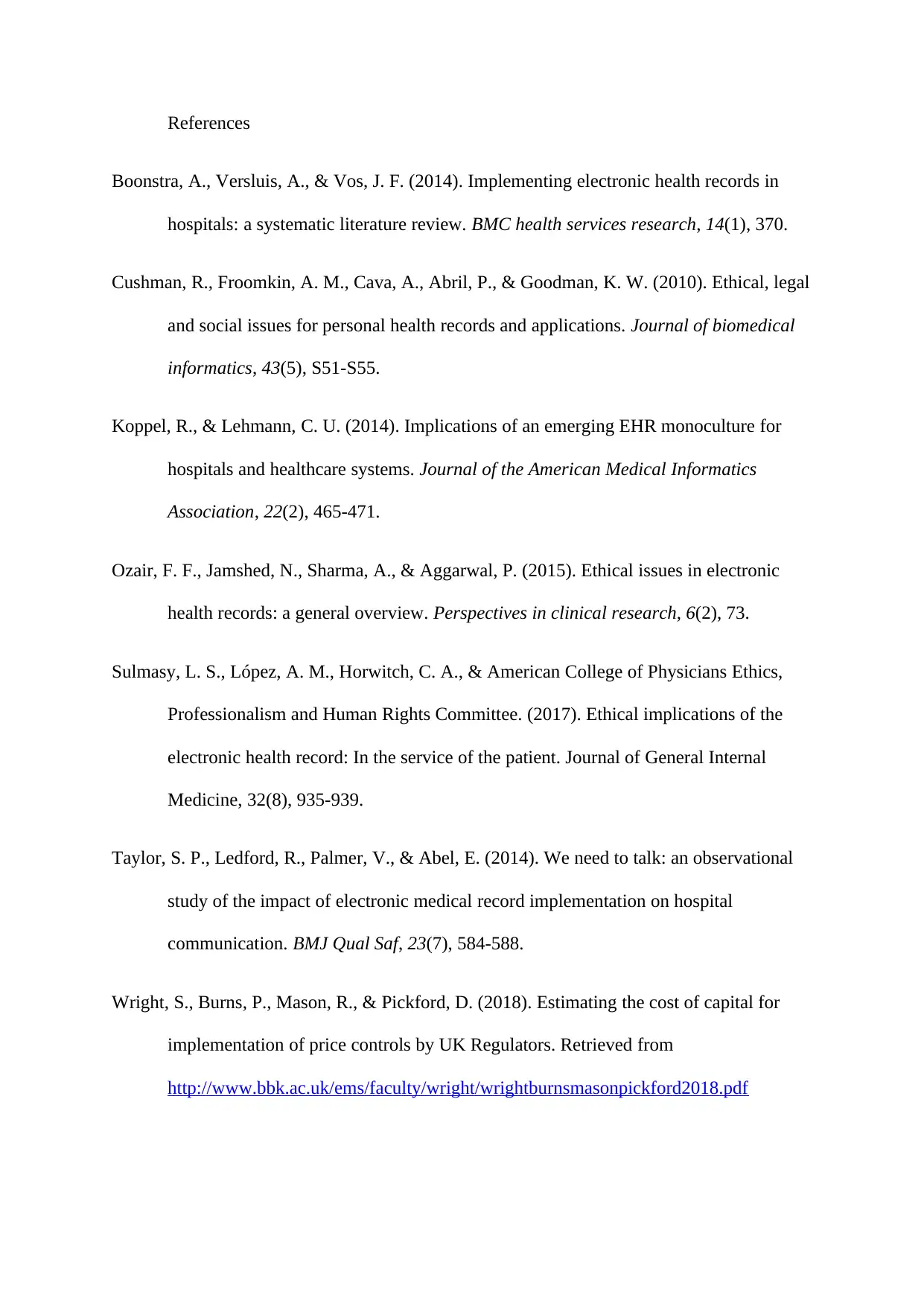CERNER EMR Implementation: Pros & Cons, Ethical Issues in Healthcare
VerifiedAdded on 2023/06/03
|4
|1231
|275
Report
AI Summary
This report provides an overview of CERNER Electronic Medical Record (EMR) technology, based on an interview with an Informatics Manager from Tyne Hospital of NHS Foundation Trust. It explores the advantages, such as real-time access to patient information and improved efficiency, and disadvantages, including the complexity of the system and time-consuming updates. The report also addresses the application and cost of the technology, highlighting the various expenses associated with implementation and training. Furthermore, it examines the impact of CERNER EMR on healthcare organizations, focusing on ethical issues like data security and accuracy, and the importance of staff education. The report references several studies to support its analysis of the benefits, challenges, and ethical considerations surrounding the use of CERNER EMR in healthcare settings.

Introduction of the technology
The whole world is experiencing the technological advancement and in healthcare
services it has brought multiple changes making it more improved and faster. Various
software and other databases are being used widely in healthcare industries and one of them
is Cerner Electronic Medical Report (EMR). It is an integrated database and it works in
providing comprehensive set of capabilities to the healthcare professionals as well as the
patients (Boonstra, Versluis & Vos, 2014). It allows to electronically capturing, storing and
accessing health related information of patients in both ambulatory and acute care setting. An
interview with Ms. Sophia Adams who is an Informatics Manager of Tyne Hospital of NHS
Foundation Trust at Newcastle, disclosed the facts associated with the Cerner EMR, which is
being widely used in the healthcare industries of Oklahoma. The following paper describes
the result of the interview.
Pros and cons of the technology
Some pros of using the technology can be said that it provides the real-time access to
the clinical information and result of the patients. The technology also allows the healthcare
organization in meeting the requirements of The Joint Commission regarding patients’
confidentiality. It also allows accessing the patients’ information from anywhere and at
anytime securely. Therefore various key benefits are there like it will improve the patient care
as the health practitioner will be able to focus on the overall health of the patients. At the
same time it also improves the efficiency of the work by placing updated information which
helps the care team to take fast as well as effective decisions (Taylor, Ledford, Palmer &
Abel, 2014). In short, it offers some advanced analytic packages to the clients that help them
in making predictive analysis and it also allows strategic consulting for a value-based patient
care.
The whole world is experiencing the technological advancement and in healthcare
services it has brought multiple changes making it more improved and faster. Various
software and other databases are being used widely in healthcare industries and one of them
is Cerner Electronic Medical Report (EMR). It is an integrated database and it works in
providing comprehensive set of capabilities to the healthcare professionals as well as the
patients (Boonstra, Versluis & Vos, 2014). It allows to electronically capturing, storing and
accessing health related information of patients in both ambulatory and acute care setting. An
interview with Ms. Sophia Adams who is an Informatics Manager of Tyne Hospital of NHS
Foundation Trust at Newcastle, disclosed the facts associated with the Cerner EMR, which is
being widely used in the healthcare industries of Oklahoma. The following paper describes
the result of the interview.
Pros and cons of the technology
Some pros of using the technology can be said that it provides the real-time access to
the clinical information and result of the patients. The technology also allows the healthcare
organization in meeting the requirements of The Joint Commission regarding patients’
confidentiality. It also allows accessing the patients’ information from anywhere and at
anytime securely. Therefore various key benefits are there like it will improve the patient care
as the health practitioner will be able to focus on the overall health of the patients. At the
same time it also improves the efficiency of the work by placing updated information which
helps the care team to take fast as well as effective decisions (Taylor, Ledford, Palmer &
Abel, 2014). In short, it offers some advanced analytic packages to the clients that help them
in making predictive analysis and it also allows strategic consulting for a value-based patient
care.
Paraphrase This Document
Need a fresh take? Get an instant paraphrase of this document with our AI Paraphraser

This technology has some disadvantages too. The main cons of Cerner EMR are, to
perform an action there is a requirement for too many clicks and a good knowledge of the
user is also necessary in order to handle this. It is a thorough solution and so getting complete
knowledge takes time. Many times, while using the software, there is a need to re-organize
the sequence of the pages which is quite problematic for the users. Also, the software is not
self-explanatory. Sometimes, enhancement of the software is very much time-consuming.
Again, after the updating of the software, it often tends to work slowly and during any
emergency, it creates issues for the users.
Application and cost of this technology
Cerner EMR software is used by many healthcare organizations to provide real-time
care as well as patient-centred care. Learning the actual pricing or cost of EMR is quite
difficult as it varies according to the providers. One time fees of this software can vary
between $2000 and $5000 as per the provider. Again, as per the number of records, the cost
of the software varies (Wright, Burns, Mason & Pickford, 2018). After buying the software
there is a requirement for in-person training. This training requires some additional cost.
There might be end-user training, group or departmental training, video based self training
etc. Therefore, apart from the installation cost in the purpose of training there will be more
expenses. According to the duration of the training session, the cost varies. Cost of support is
also an important factor and so there will be subscription cost too.
Implication Impact of the technology
Implication of the software into the working practice of any healthcare organization
creates huge impact. It affects the overall working as well as record-keeping pattern of the
organization. Cerner EMR improves the efficiency by reducing the time of record keeping
and it also allows users to access health information of the patient which is highly effective in
perform an action there is a requirement for too many clicks and a good knowledge of the
user is also necessary in order to handle this. It is a thorough solution and so getting complete
knowledge takes time. Many times, while using the software, there is a need to re-organize
the sequence of the pages which is quite problematic for the users. Also, the software is not
self-explanatory. Sometimes, enhancement of the software is very much time-consuming.
Again, after the updating of the software, it often tends to work slowly and during any
emergency, it creates issues for the users.
Application and cost of this technology
Cerner EMR software is used by many healthcare organizations to provide real-time
care as well as patient-centred care. Learning the actual pricing or cost of EMR is quite
difficult as it varies according to the providers. One time fees of this software can vary
between $2000 and $5000 as per the provider. Again, as per the number of records, the cost
of the software varies (Wright, Burns, Mason & Pickford, 2018). After buying the software
there is a requirement for in-person training. This training requires some additional cost.
There might be end-user training, group or departmental training, video based self training
etc. Therefore, apart from the installation cost in the purpose of training there will be more
expenses. According to the duration of the training session, the cost varies. Cost of support is
also an important factor and so there will be subscription cost too.
Implication Impact of the technology
Implication of the software into the working practice of any healthcare organization
creates huge impact. It affects the overall working as well as record-keeping pattern of the
organization. Cerner EMR improves the efficiency by reducing the time of record keeping
and it also allows users to access health information of the patient which is highly effective in

the healthcare settings before taking any clinical decision. However, the cost of
implementation is an issue and various other issues also associated with the usage of the
software while working.
Ethical issues with it
The interview with the Informatics Manager also revealed that ethical issues are also
associated with the implementation of Cerner EMR into the clinical settings of healthcare
organizations. Inappropriate third-party access to the private and confidential data of the
patients can be a threat (Cushman, Froomkin, Cava, Abril & Goodman, 2010). Therefore,
data security might be an ethical issue of EMR (Ozair, Jamshed, Sharma & Aggarwal, 2015).
Implementation of the software also required federal and legal consent also. Data inaccuracy
is another concern of it as a large amount of data is saved and while entering data with “cut
and paste” policy, many errors can occur (Sulmasy, López, Horwitch & American College of
Physicians Ethics, Professionalism and Human Rights Committee, 2017). Educating the
staffs on this might create ethical issues after the implementation of the software into the
clinical settings of any healthcare organization.
implementation is an issue and various other issues also associated with the usage of the
software while working.
Ethical issues with it
The interview with the Informatics Manager also revealed that ethical issues are also
associated with the implementation of Cerner EMR into the clinical settings of healthcare
organizations. Inappropriate third-party access to the private and confidential data of the
patients can be a threat (Cushman, Froomkin, Cava, Abril & Goodman, 2010). Therefore,
data security might be an ethical issue of EMR (Ozair, Jamshed, Sharma & Aggarwal, 2015).
Implementation of the software also required federal and legal consent also. Data inaccuracy
is another concern of it as a large amount of data is saved and while entering data with “cut
and paste” policy, many errors can occur (Sulmasy, López, Horwitch & American College of
Physicians Ethics, Professionalism and Human Rights Committee, 2017). Educating the
staffs on this might create ethical issues after the implementation of the software into the
clinical settings of any healthcare organization.
⊘ This is a preview!⊘
Do you want full access?
Subscribe today to unlock all pages.

Trusted by 1+ million students worldwide

References
Boonstra, A., Versluis, A., & Vos, J. F. (2014). Implementing electronic health records in
hospitals: a systematic literature review. BMC health services research, 14(1), 370.
Cushman, R., Froomkin, A. M., Cava, A., Abril, P., & Goodman, K. W. (2010). Ethical, legal
and social issues for personal health records and applications. Journal of biomedical
informatics, 43(5), S51-S55.
Koppel, R., & Lehmann, C. U. (2014). Implications of an emerging EHR monoculture for
hospitals and healthcare systems. Journal of the American Medical Informatics
Association, 22(2), 465-471.
Ozair, F. F., Jamshed, N., Sharma, A., & Aggarwal, P. (2015). Ethical issues in electronic
health records: a general overview. Perspectives in clinical research, 6(2), 73.
Sulmasy, L. S., López, A. M., Horwitch, C. A., & American College of Physicians Ethics,
Professionalism and Human Rights Committee. (2017). Ethical implications of the
electronic health record: In the service of the patient. Journal of General Internal
Medicine, 32(8), 935-939.
Taylor, S. P., Ledford, R., Palmer, V., & Abel, E. (2014). We need to talk: an observational
study of the impact of electronic medical record implementation on hospital
communication. BMJ Qual Saf, 23(7), 584-588.
Wright, S., Burns, P., Mason, R., & Pickford, D. (2018). Estimating the cost of capital for
implementation of price controls by UK Regulators. Retrieved from
http://www.bbk.ac.uk/ems/faculty/wright/wrightburnsmasonpickford2018.pdf
Boonstra, A., Versluis, A., & Vos, J. F. (2014). Implementing electronic health records in
hospitals: a systematic literature review. BMC health services research, 14(1), 370.
Cushman, R., Froomkin, A. M., Cava, A., Abril, P., & Goodman, K. W. (2010). Ethical, legal
and social issues for personal health records and applications. Journal of biomedical
informatics, 43(5), S51-S55.
Koppel, R., & Lehmann, C. U. (2014). Implications of an emerging EHR monoculture for
hospitals and healthcare systems. Journal of the American Medical Informatics
Association, 22(2), 465-471.
Ozair, F. F., Jamshed, N., Sharma, A., & Aggarwal, P. (2015). Ethical issues in electronic
health records: a general overview. Perspectives in clinical research, 6(2), 73.
Sulmasy, L. S., López, A. M., Horwitch, C. A., & American College of Physicians Ethics,
Professionalism and Human Rights Committee. (2017). Ethical implications of the
electronic health record: In the service of the patient. Journal of General Internal
Medicine, 32(8), 935-939.
Taylor, S. P., Ledford, R., Palmer, V., & Abel, E. (2014). We need to talk: an observational
study of the impact of electronic medical record implementation on hospital
communication. BMJ Qual Saf, 23(7), 584-588.
Wright, S., Burns, P., Mason, R., & Pickford, D. (2018). Estimating the cost of capital for
implementation of price controls by UK Regulators. Retrieved from
http://www.bbk.ac.uk/ems/faculty/wright/wrightburnsmasonpickford2018.pdf
1 out of 4
Related Documents
Your All-in-One AI-Powered Toolkit for Academic Success.
+13062052269
info@desklib.com
Available 24*7 on WhatsApp / Email
![[object Object]](/_next/static/media/star-bottom.7253800d.svg)
Unlock your academic potential
Copyright © 2020–2026 A2Z Services. All Rights Reserved. Developed and managed by ZUCOL.





